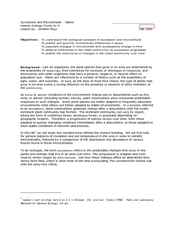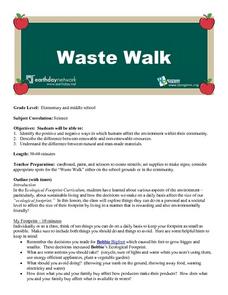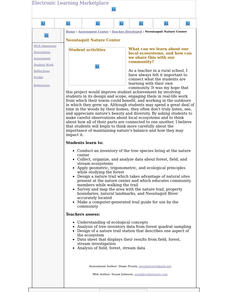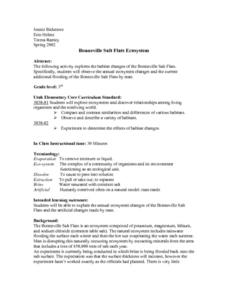Curated OER
Flowering Phenology: How Do Plants Know When to Flower?
Students study the process of plant reproduction and the biotic and abiotic factors that affect flowering phenology. In this plant reproduction lesson, students describe the interaction of environmental factors as it relates to...
Curated OER
BIOMIMICRY, Housing Naturally: Habitat as Model
Students explore natural animal habitats. In this lesson on biomimicry and habitation design, students will use classroom and field examples to examine animal habitats. Students will construct a model of a natural animal habitat. This...
Curated OER
Finding the Basal Area of a Forest Plot to Determine Stocking Levels
Learners use graphs and plots to measure the basal area and stocking levels. In this graphing instructional activity students work in the field the use their data to help them complete a lab activity.
Curated OER
Let's Hit the Slopes!
Students study benthic communities in the Gulf of Mexico and explain their roles. In this investigative lesson students participate in a group activity and study how to calculate and index of biological communities.
Curated OER
Wetlands Issues
In this wetlands worksheet, students write questions for topics in a game about the wetlands. Students write 5 questions for each topic.
Curated OER
Blue Planet: Open Ocean
Students research facts about animal species. In this ocean activity students view a video, prepare illustrated cards and create a food-web display.
Curated OER
A Living Watershed
Students, through this series of lessons, use local resources, speakers, print and video materials, as well as standard text materials to study the ecosystem of the local watershed.
Curated OER
Succession and Microclimate
Students compare the population of insects in different microclimates. In this biology lesson, students collect data using probes to tabulate temperature and soil data. They predict how certain parameters change as an area goes through...
Curated OER
Current Events and Fish
Fifth graders examine current events impacting aquatic life in their communities. They search for newspaper, magazine and television reports for information about aquatic life in local bodies of water. Students can write letters to...
Curated OER
Environment: Waste Walk
Students assess the positive and negative affects of humans on the environment. The lesson explores ways in which individuals and societies can reduce the negative impact on the environment. By taking a "waste walk" around their campus,...
Curated OER
Chesapeake Bay Population Studies
Students determine how to use a quarter meter quadrant to find population density, relative density, frequency and how to calculate a diversity index while participating in a virtual field trip. They study how to establish a Correlation...
Curated OER
Habitat Unit - Day 2
Learners explore abiotic factors that affect habitats. After a class lecture, students work in groups to answer questions about plant tissue, production and growth. They share answers, complete a crossword puzzle, and create a habitat...
Curated OER
Neotaquit Nature Center: Ecosystems, Science, Technology
Students survey their local forest conducting an inventory of tree species and analyzing data of local ecosystems. They design a nature trail, map the area and make a computer generated trail guide.
Curated OER
Project Wetlands
Students develop a joint undertaking designed to solve an environmental problem in their local community. They tackle the problem of erosion of banks and chemical run-off into a nearby lake, which is within walking distance of school.
Curated OER
The Arctic and Taiga Ecozone of Canada
Students discover the differences in the Arctic and Taiga regions of Canada. They identify physical and human characteristics of both region. They also practice using an atlas.
Curated OER
The Arctic and Taiga Ecozone of Canada
Students examine the various sub-regions of the Arctic and Taiga zones in Canada. Using the online Canadian Atlas, they locate and describe the characteristics of each zone. They organize their information into a chart and share it with...
Curated OER
Who Can Harvest A Walleye?
Seventh graders investigate the concept of how an ecosystem is put together while conducting research using a variety of resources. They correctly differentiate between a herbivore and carnivore by placing them in the order of hierarchy...
Curated OER
the Wonder of Wetlands
Students explore the importance of the wetland ecosystem, its properties and functions, as well as, the many birds, animals, and plant life found there.
Curated OER
Spinning the Eco Web
Students examine the components and relationships of ecoregions and ecosystem management. They define ecoregion and ecosystem, list ecoregions, and participate in a simulation that demonstrates the connections between parts of the...
Curated OER
Unit on Religion and Globalization
For this religion lesson, students examine the role of religion and globalization. They discover the differences in attitudes toward globalization in different religions. They also examine how globalization has helped to spread religion.
Curated OER
Building Buildings
Students work together with a partnet to design a building. Using materials, they create the inside and outside of the structure along with works of art. They present their creation to the class and receive constructive criticism in return.
Curated OER
Adapted to Fire
Fourth graders explore forest species' adaptations to fire by participating in a scavenger hunt and mapping a burned forest. Students create maps and explore how indigenous species adapted to living with fire.
Curated OER
Salinity Of Soil
Fourth graders investigate the contents of various types of soil to determine the differences in salinity levels. They conduct an experiment of observing the plants in the different soils. Students then determine survival rates by...
Curated OER
Bonneville Salt Flats Ecosystem
Students discuss the annual ecosystem changes of the Bonneville Salt
Flats and the artificial changes made by man.They observe the annual ecosystem changes and the current additional flooding of the Bonneville Salt Flats by man.

























